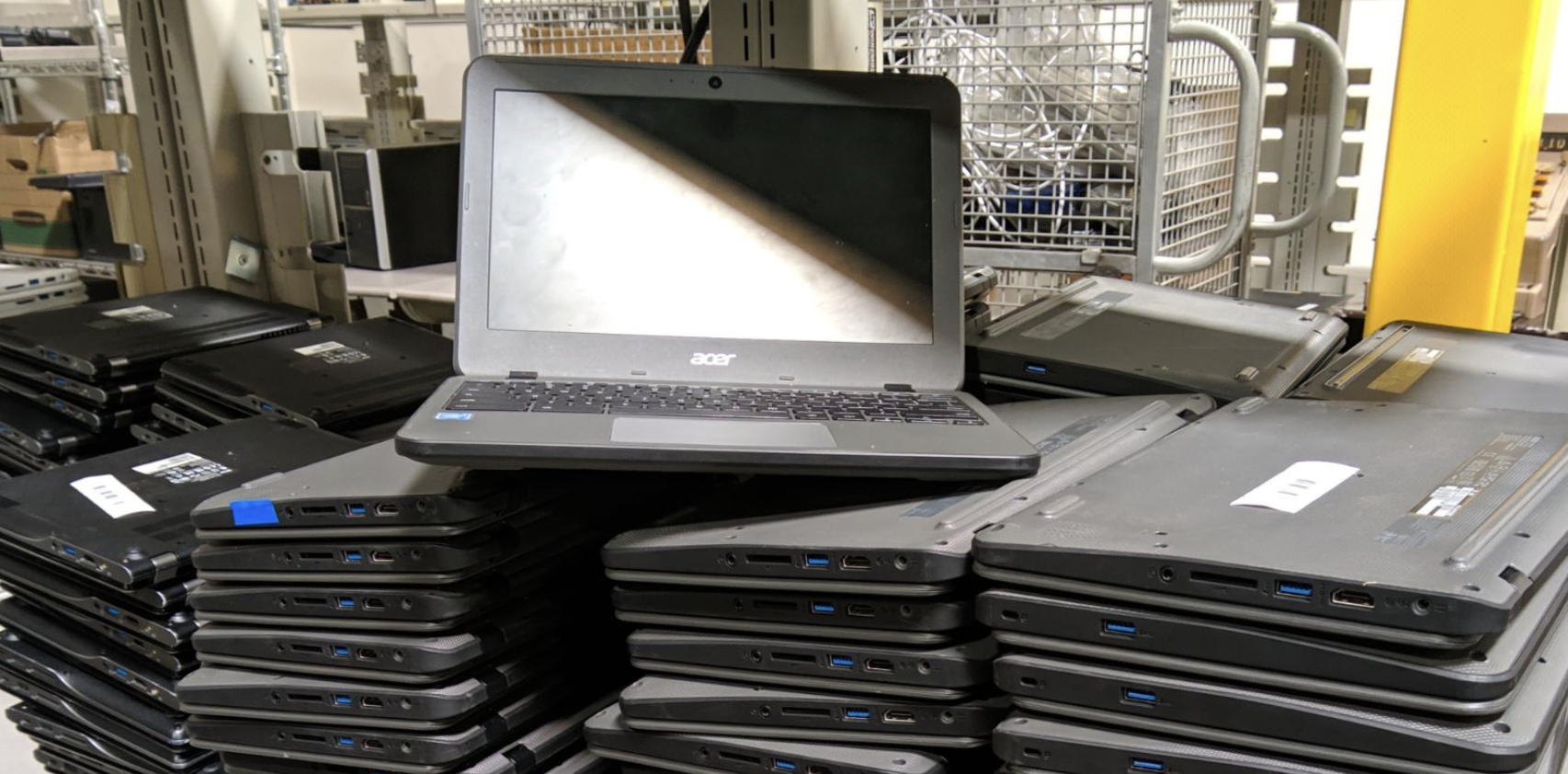Written By: Hannah Nasluchacz, Staff Writer
RATIONALIZE: Poly High School gives out chromebooks to every student and students tend to use them for the wrong reasons.
Before the Covid 19 pandemic lockdown, students at Poly High School did not have individual Chromebooks that they checked out with the library. There was less reliance on technology to complete school work and homework. If students needed to use computers, they would go to Poly’s computer lab. Today, the old computer lab is a converted math classroom that still has evidence of being a retired computer lab, with poles still going up to the ceiling and a storage room at the back of the main room. Having students be responsible brings their own sets of problems, like Chromebooks being dropped or destroyed or them not being returned at the end of the school year. These problems, even though they give students trouble, do not affect them in the long run. Giving every single student a Chromebook has negative consequences that directly affects them including: distraction issues, technological ignorance, and cheating, which, without the student’s individual self-control, could set them back in their education.
Our school issued Chromebooks.
It is more difficult to focus while having the temptation of other windows and media open to a student’s discretion. For example, I am writing this now on my Chromebook that was given to me by the school and just while writing this introduction, I have thought about clicking on a different tab to try and work on my math homework. Not focusing at the task at hand may cause the task to take longer or not be done to the quality it could have been done. Multitasking has been shown to cause constant distraction due to the overlapping thought processes that it takes to complete each task.
Even though Chromebooks are a constant distraction when writing, they are also a useful tool when writing because it is much faster to type out your words, use spell check, use the internet to search up facts that are needed to create essays or any type of writing that is done in school. Even though this is true, there are other tools that can help students complete the same task without Chromebooks, like dictionaries and libraries that hold information that is needed to write with accuracy. For example, say a student does not know an answer to a problem. Instead of taking the time to think about it and solve it, they might use the internet to look up the answer. Now they have turned their brain to a new subject or surfed the internet when they could have taken the chance to expand their brain and think about the answer.
On the other hand, a student who wants to truly learn could use these Chromebooks as a way to get tutoring and explanations on how to solve questions, instead of just wanting to find the answers. But, most of the time, students procrastinate and end up trying to finish assignments late at night leaving them desperate to finish quickly so they can go to bed. Using Chromebooks and the internet to complete tasks takes the distraction that is closed across the room and puts it smack right in front of the student to use.
Since Chromebooks are man made, there is always a chance that technology could fail you at the worst possible moments. Work that is due on the day it is received but is unable to be done could be due to the Chromebook screen cracking or keys not responding. This affects the students ability to complete the work and holds them back from learning the required material. This could also lead to a domino effect that could leave a student behind for weeks or months. That being said, there are resources that help students with their broken technology in the library, but after that student goes home for the day, there’s nothing they can do until the next morning when the library is open again. In order for Chromebooks to work, they need to be connected to the internet and maintain the internet. Sometimes, this is compromised at school, as the WiFi must encompass thousands of devices.. That means if a teacher is doing a class Edpuzzle or a Kahoot game and the internet goes out, the teacher’s lesson plan is out the door. They have to find something else to do, or, if only one Chromebook is having trouble with its connection, that leaves only one student unable to practice and learn what they do not understand. There are methods of getting around a slow connection like using a hotspot or turning off and on the WiFi setting, but when there are no formal classes teaching students and staff how to use Chromebooks, there can be confusion on how to fix connection problems.
Even without the internet and Chromebooks, students can cheat by using the people around them or objects around them to gain information that is needed to them. However, with tests on a Chromebook, it becomes much easier. With some tests like math being on websites like Delta math or Illuminate, students can easily click over to a different tab and search up the answer.. It is understandable to think that if a teacher gives a test on a website that is so easy to cheat from that they are not helping the students.. This is not the only thing that needs to be taken into consideration. A student’s education is what makes them a functioning member of society, and without them understanding basic core, subjects like science, math, and reading, their education could possibly be compromised. Students can not only trick teachers, but they can trick themselves into thinking that they know more than they actually do. When students get assignments and do not understand how to analyze the text or solve an equation, they turn to the internet and websites like Photomath or SparkNotes. Most students access these websites through their phones, which is not the fault of the Chromebooks, but students still use their computers to google questions and get answers too.

There is some irony that I am writing about the consent needed for every student to have a Chromebook at their use while currenting typing out this argument on my school issued Chromebook. At the same time, if classes require the use of a Chromebook, there’s not a way students can get around using one to complete their assignments.. Sometimes, Chromebooks are necessary for an assignment, like for research or to access online textbooks for a class.
Students having Chromebooks leaves them suspecting of getting distracted by either not paying attention to the teacher or not being able to focus on home assignments that need to be done. Schools also assign student Chromebooks without giving them proper lessons on how to work each thing on the Chromebook, so when they run into problems, they are required to ask for assistance from teachers that are in the same position they are. Students also use tech for what they think is an advantage, but becomes a disadvantage when they use it to avoid doing and understanding the work that they need to know to grow in their knowledge.
When gauging students the responsibility of a Chromebook, it needs to be thought over the ramifications and the self-control high school students have when using other devices. In order to have individual chromebooks to make students successful, they first need to learn tools of self-control to use the chromebooks to their advantage. The question is – can students be taught “self control?”

